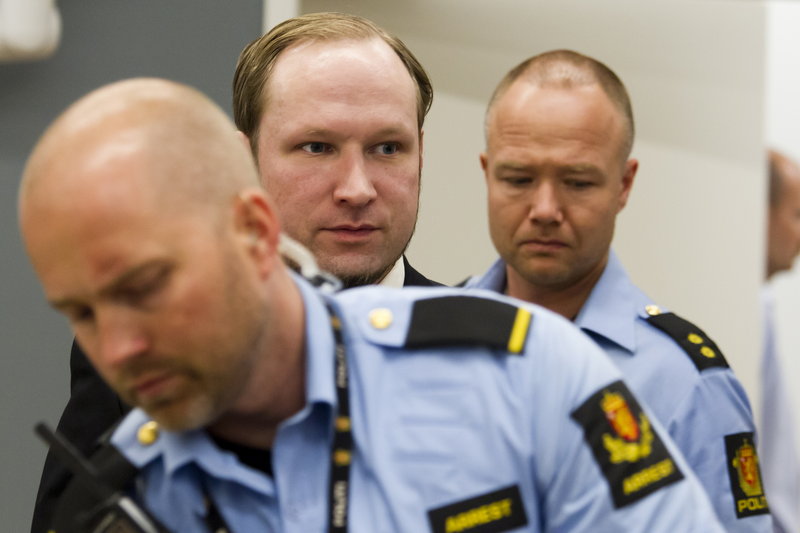OSLO, Norway – Norway’s commitment to face xenophobia with tolerance on the first anniversary of bomb and gun attacks by a confessed right-wing killer is being put to the test by hostile reactions to an influx of Gypsies from Eastern Europe.
Norwegian Prime Minister Jens Stoltenberg said he has been disturbed by the tone of the debate over the small camps of makeshift huts set up by Gypsies in Oslo and other Norwegian cities.
After neighbors complained of unsanitary conditions, noise and illegal construction, anti-immigration politicians called for the Gypsies, also known as Roma, to be rounded up and bussed out of Norway. Online, the debate has been raw, sometimes racist.
“Some of what we have seen is frightening,” Stoltenberg told Norwegian broadcaster TV2 this week. “Nobody shall be judged because they belong to a certain ethnic group.”
The anti-Gypsy sentiment has been no worse than elsewhere in Europe — in fact many of the Roma say they are treated better in Norway than in their home countries, including Romania and Bulgaria.
But the discussion comes at an uncomfortable time for Norway as it prepares to honor the 77 victims of the country’s worst peacetime massacre in services across the country today.
Confessed killer Anders Behring Breivik, facing sentencing next month, has said his July 22, 2011, bombing of a government high-rise and shooting spree at a left-wing party’s youth camp were the opening shots in a war against multiculturalism.
Virtually all of Norway condemned the attacks — even far-right groups — and Stoltenberg moved the nation with his call for more openness, democracy and inclusiveness.
The debate over immigration, more civil in Norway than in many parts of Europe, was muted for months. But a harsher tone returned as authorities received complaints over the Roma camps.
“Enough is enough. Arrange a bus, send them out,” Siv Jensen, the leader of the anti-immigration Progress Party, told public broadcaster NRK.
While not a European Union member, Norway is a close partner of the 27-nation bloc and allows citizens of EU nations including Romania and Bulgaria to enter freely and stay for up to three months without registering with authorities.
Since the government doesn’t keep count of EU nationals entering the country, there are no official numbers on how many Roma have arrived. But rights activists say they have noticed an increase in Roma coming to Norway, which is largely unaffected by Europe’s financial crisis due to its vast resources of offshore oil and gas.
At a camp of about 100 people hidden in a forest on public land on the outskirts of Oslo, Cristian Florian Tudescu, a 31-year-old from Romania, said he had lived in Turkey and Greece for years before coming to Norway.
In Oslo, he said, he earns about $30 on a good day collecting and returning bottles for deposit. He also earns money selling a magazine set up by a nonprofit that supports Roma in Norway.
“It’s king here,” Tudescu said in broken English, adding that Norwegian people had been good to him, despite isolated incidents of being spat on and called a thief.
To address concerns that the Roma may try to exploit Norway’s generous welfare system, the Ministry of Labor called a news conference explaining that foreigners coming to Norway would only qualify for social benefits if they have full-time jobs.
“Begging by law is not illegal, but that does not mean it is considered to be a job,” deputy Labor Minister Gina Lund said. She said the Roma, like any other European visitors, “will have to provide for themselves while being in Norway.”
Eskil Pedersen, the head of the Labor Party youth organization that was attacked by Breivik and a survivor of the summer-camp massacre on Utoya island, said that the negative comments about Roma had made him sick to his stomach.
But he added that the counter-reaction by many Norwegians speaking out against anti-Roma rhetoric shows that the spirit of inclusiveness following last year’s attacks was alive and well.
“There has been a lot of commitment in social media calling for human rights and tolerance,” he said. “That commitment wasn’t as strong before in similar debates.”
Anniversary arrangements today will include a wreath-laying ceremony at the bomb site in Oslo, a speech by the prime minister, a church service attended by the royal family in Oslo’s cathedral, a ceremony for survivors on Utoya and a memorial concert in downtown Oslo.
Send questions/comments to the editors.



Success. Please wait for the page to reload. If the page does not reload within 5 seconds, please refresh the page.
Enter your email and password to access comments.
Hi, to comment on stories you must . This profile is in addition to your subscription and website login.
Already have a commenting profile? .
Invalid username/password.
Please check your email to confirm and complete your registration.
Only subscribers are eligible to post comments. Please subscribe or login first for digital access. Here’s why.
Use the form below to reset your password. When you've submitted your account email, we will send an email with a reset code.